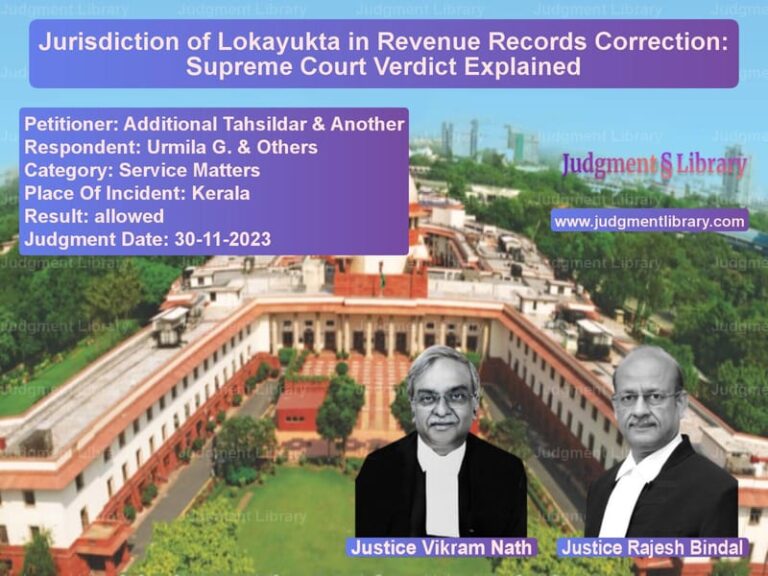Supreme Court Upholds ‘Change in Law’ Compensation for Adani Power in Maharashtra Electricity Dispute
The case of Maharashtra State Electricity Distribution Company Limited vs. Adani Power Maharashtra Limited & Others revolves around the legal interpretation of ‘Change in Law’ in Power Purchase Agreements (PPAs) and its impact on compensatory tariff adjustments. The Supreme Court upheld the decision of the Appellate Tribunal for Electricity (APTEL), confirming that the introduction of the SHAKTI Policy and the deallocation of coal blocks entitled Adani Power to compensation.
Background of the Case
Adani Power Maharashtra Limited (APML) entered into four long-term PPAs with Maharashtra State Electricity Distribution Company Limited (MSEDCL) for power supply from its Tiroda Thermal Power Station. Initially, APML was to source coal from the Lohara Coal Blocks. However, after the bid cut-off date, government policy changes led to the deallocation of the Lohara Coal Blocks and amendments to the coal distribution policies, including the introduction of the SHAKTI Policy in 2017.
APML sought compensation under the ‘Change in Law’ provisions of the PPAs, citing increased coal procurement costs. The Maharashtra Electricity Regulatory Commission (MERC) ruled in favor of Adani Power but limited certain compensatory claims. Both MSEDCL and APML appealed to APTEL, which upheld most of Adani Power’s claims. MSEDCL subsequently challenged the decision before the Supreme Court.
Legal Issues Before the Court
- Whether the deallocation of Lohara Coal Blocks and the SHAKTI Policy qualified as ‘Change in Law’ events under the PPAs.
- Whether Adani Power was entitled to compensation for increased coal costs.
- Whether APTEL and MERC applied the correct methodology for computing compensation.
Arguments by the Petitioner (MSEDCL)
MSEDCL challenged the APTEL ruling, arguing that:
- “The responsibility for fuel procurement lay solely with Adani Power under the Case-1 bidding process.”
- “Deallocation of coal blocks was a matter between Adani Power and Coal India Limited, and MSEDCL should not bear the consequences.”
- “The introduction of the SHAKTI Policy merely replaced earlier coal policies and did not constitute a ‘Change in Law’ event.”
- “The compensatory methodology adopted by APTEL and MERC was flawed and excessive.”
Arguments by the Respondent (Adani Power Maharashtra Limited)
Adani Power countered MSEDCL’s claims, stating that:
- “The bid was submitted based on the assured availability of coal from Lohara Coal Blocks, which was later revoked due to government policy changes.”
- “The Supreme Court in Energy Watchdog vs. CERC held that changes in government policies affecting coal supply qualify as ‘Change in Law.’”
- “MSEDCL was part of the expert committee that agreed on the methodology for compensating Adani Power.”
- “Failure to compensate would violate the principle of restitution under contract law.”
Supreme Court’s Analysis and Judgment
The Supreme Court upheld the findings of MERC and APTEL, affirming that:
- “The deallocation of the Lohara Coal Blocks was caused by government policy changes, which were beyond Adani Power’s control.”
- “The introduction of the SHAKTI Policy reduced the assured coal supply, constituting a ‘Change in Law’ event under the PPAs.”
- “Adani Power should be compensated to restore it to the same economic position as if the ‘Change in Law’ event had not occurred.”
- “MSEDCL participated in the expert committee, agreed on compensatory measures, and therefore could not later contest them.”
The Supreme Court ruled:
“The restitutionary principle has been consistently applied in previous judgments. The generating companies must be restored to the same economic position as if no ‘Change in Law’ had occurred.”
Key Takeaways from the Judgment
- Government actions affecting coal availability qualify as ‘Change in Law.’
- Power producers are entitled to compensation when unforeseen regulatory changes impact fuel supply.
- Regulatory bodies must ensure that energy contracts remain viable despite government interventions.
- Judicial review of regulatory decisions ensures adherence to fair economic principles.
Impact of the Judgment
This ruling has significant implications for the power sector in India, reinforcing that power producers should be protected from external regulatory changes. It sets a precedent that ensures fair treatment under long-term PPAs and upholds the principle that compensatory mechanisms should be applied when unforeseen policy changes disrupt agreed contractual terms.
By ruling in favor of Adani Power, the Supreme Court emphasized the need for stability in energy contracts and the importance of ensuring that private investments in infrastructure are not jeopardized by unpredictable regulatory changes.
Petitioner Name: Maharashtra State Electricity Distribution Company Limited.Respondent Name: Adani Power Maharashtra Limited and Another.Judgment By: Justice B.R. Gavai, Justice Vikram Nath.Place Of Incident: Maharashtra.Judgment Date: 20-04-2023.
Don’t miss out on the full details! Download the complete judgment in PDF format below and gain valuable insights instantly!
Download Judgment: maharashtra-state-el-vs-adani-power-maharash-supreme-court-of-india-judgment-dated-20-04-2023.pdf
Directly Download Judgment: Directly download this Judgment
See all petitions in Company Law
See all petitions in Corporate Compliance
See all petitions in unfair trade practices
See all petitions in Bankruptcy and Insolvency
See all petitions in Mergers and Acquisitions
See all petitions in Judgment by B R Gavai
See all petitions in Judgment by Vikram Nath
See all petitions in dismissed
See all petitions in supreme court of India judgments April 2023
See all petitions in 2023 judgments
See all posts in Corporate and Commercial Cases Category
See all allowed petitions in Corporate and Commercial Cases Category
See all Dismissed petitions in Corporate and Commercial Cases Category
See all partially allowed petitions in Corporate and Commercial Cases Category







